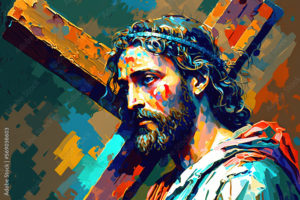Currency of the Cross
 A beloved former member of the OKC Thunder, Russell Westbrook proudly holds the NBA record with 198 triple-doubles in his career. But for many local children and families, his most significant impact wasn’t in the arena; it was in the education scholarships he awarded, the community centers he revitalized, and programs he funded for kids who may never touch an NBA floor. What always struck people about “Russ” was his normalcy. It wasn’t uncommon to see him grocery shopping at the local market or chatting with strangers at stoplights. This funny, vivacious fashion icon embodied the superpowers of basketball, teamwork, fan loyalty, and service to others.
A beloved former member of the OKC Thunder, Russell Westbrook proudly holds the NBA record with 198 triple-doubles in his career. But for many local children and families, his most significant impact wasn’t in the arena; it was in the education scholarships he awarded, the community centers he revitalized, and programs he funded for kids who may never touch an NBA floor. What always struck people about “Russ” was his normalcy. It wasn’t uncommon to see him grocery shopping at the local market or chatting with strangers at stoplights. This funny, vivacious fashion icon embodied the superpowers of basketball, teamwork, fan loyalty, and service to others.
But isn’t it interesting that by today’s standards, we expect athletes, business leaders, and even politicians to “give back”? After spending more than a decade in a non-profit fundraising career, I never hesitated to ask for their support in the work of human flourishing. Yet here’s the million-dollar question Tom Holland raises in his book Dominion: The Making of the Western Mind: why do we expect anything at all?
Seriously, how did we move from an era when the Roman Colosseum staged bloodbaths between men and beasts for entertainment to a society that values compassion? A walk through any ancient European city makes it clear: statues and monuments were created to recognize power. The wealthy pursued honor, glory, and status, while humility and compassion were despised as weaknesses. The idea that the greatest should stoop to serve the least would have been shocking and offensive.
Holland, who doesn’t claim orthodox Christian belief, openly admits, “His values and moral framework are thoroughly shaped by Christianity.”[1] That conviction forms the heart of Dominion, which argues that Christianity is the revolutionary force that redefined Western morality. The crucifixion of Christ upended ancient ideas about honor and power. Here was a sinless man, a humble king, who washed the feet of his followers and insisted that “the last shall be first.”[2] Jordan Peterson echoes the same point: “The Western ethos is saturated in Judeo-Christian stories. Even if you are atheist, you live your life inside a structure that is thoroughly Christian.”[3]
Christianity turned the world upside down by celebrating humility and elevating the weak; however, opposing forces have always lurked in the shadow of salvation. Particularly relevant in today’s environment is capitalism, which has had a decisive influence on the Western mind and culture in ways that explicitly conflict with the Christian ethos. Our market-driven values celebrate efficiency, innovation, and consumption. To its credit (pun intended), capitalism has lifted millions from poverty and fueled progress, yet its instinct to ‘give back’ borrows more from Christianity’s moral code than from the free market itself. Simultaneously, our enterprise system opposes the Christian revolution. A perfect example is the 2008 U.S. financial crisis and how quickly and easily markets became warped by greed, which fueled the wealth divide. Economist Joseph Stiglitz warned of this very thing – inequality eroding trust and social bonds,[4] while Pope Francis labeled capitalism an “economy of exclusion” that forgets the poor.[5]
have always lurked in the shadow of salvation. Particularly relevant in today’s environment is capitalism, which has had a decisive influence on the Western mind and culture in ways that explicitly conflict with the Christian ethos. Our market-driven values celebrate efficiency, innovation, and consumption. To its credit (pun intended), capitalism has lifted millions from poverty and fueled progress, yet its instinct to ‘give back’ borrows more from Christianity’s moral code than from the free market itself. Simultaneously, our enterprise system opposes the Christian revolution. A perfect example is the 2008 U.S. financial crisis and how quickly and easily markets became warped by greed, which fueled the wealth divide. Economist Joseph Stiglitz warned of this very thing – inequality eroding trust and social bonds,[4] while Pope Francis labeled capitalism an “economy of exclusion” that forgets the poor.[5]
To no one’s surprise, the Western mind has been molded by many competing forces. But the cross and currency have played the most significant role in shaping our understanding of success and sacrifice. Christianity insists that the last shall be first, while today’s economic norms insist that the first must remain first. Adding to the pressure is the massive influence of technology compounded by the weight of social challenges, such as gun violence, rising homelessness, a decline in religion, and an increasing ambivalence toward government. The question then becomes, how will our future will be defined?
At its heart, Dominion is a genealogical history about us. Everyday, we live at the crossroads of conflict, and every intersection calls for a choice. Will we celebrate power, wealth, and greed? Or will we follow the example Jesus modeled in humility, compassion, and grace? As Tom Holland reminds us, “The Christian revolution still echoes in every expectation we place on leaders, neighbors, and ourselves: to serve rather than to dominate, to give rather than to hoard.[6]
Our legacy, both personal and communal, will be written by how we respond to the challenges before us. Will we love our neighbors as ourselves? Will we resist the pull of modern provocateurs emboldened by stature, power, and wealth? The Christian answer is clear: we do not become like them. We stand firm in love, steadfast in service, and confident that grace has the final word. This is the story worth living, and the story worth leaving behind.
[1] Holland, Tom. “Tom Holland: Why I Was Wrong about Christianity.” New Statesman, September 14, 2016. Accessed September 10, 2025. https://www.newstatesman.com/politics/religion/2016/09/tom-holland-why-i-was-wrong-about-christianity
[2] “Bible Gateway Passage: Matthew 20:16 – King James Version.” Bible Gateway. Accessed September 10, 2025. https://www.biblegateway.com/passage/?search=Matthew%2020%3A16&version=KJV.
[3] “The Big Conversation Show.” YouTube. Jordan Peterson Debates Atheist Susan Blackmore. Last modified June 12, 2018. Accessed September 10, 2025. https://www.youtube.com/watch?v=JvkMd4uENX8.
[4] Stiglitz, Joseph E. The Price of Inequality. New York: W. W. Norton & Company, 2013.
[5] Francis. Evangelii Gaudium: To the Bishops, Clergy, Consecrated Persons and the Lay Faithful, on the Proclamation of the Gospel in Today’s World. London: Catholic Truth Society, 2013.
[6] Holland, Tom. Dominion: The Making of the Western Mind. Paperback edition. London: ABACUS, 2020.
8 responses to “Currency of the Cross”
Leave a Reply
You must be logged in to post a comment.
Incredible post Jennifer! Thank you. I love your image of the intersection between capitalism and christianity. what are some simple steps someone could take towards christ-centered values at this intersection?
Thank you, Ryan. Christians are aware of the idolism of money, so being aware and not tethered to it is one step. This can be achieved through generosity and respect for others – showing honor. We should also think ahead about how our choices will impact others around us. You can use prayer when making financial plans/decisions to make sure you are operating a clean heart without greed. God wants us to steward the things he gives us, which includes relationships! The more you position yourself to think of others, the less you are worried about money, perception, status, and more.
Jennifer, I agree with Ryan, you did a great job bringing these two together. With you vast experience with underserved and vulnerable people, I would welcome your counsel. Besides prayer, as you indicated above, what are some other ways you have learned how to balance the tension between generosity and discernment (against unhealthy causes such as drugs, etc)?
Thank you, Kari. I am personally not tempted by drugs, etc. However, guilt and obligation are what I have to check myself against. Am I doing this (whatever it is) as a cheerful giver? If not, that probably means I am feeling some sort of obligation, and the effort is not authentic. That tends to be my personal yardstick. Good question!
Hi Jennifer, your post hits on some of the important points. I was particularly drawn to your comments on the difference between the colosseum’s bloodbaths and a call to service in Christianity, as well as considering the impact of wealth today. In your time raising money, did you find most people responded from the mindset of giving or was their status in the way of them sharing resources?
Great question. Oddly enough, in my days of serving the food bank, I found there were businesses that gave primarily because they could get brand recognition out of the deal. It was an inexpensive form of advertisement. When I transitioned to prison ministry, I assumed there would be many of the same donors (due to the Matthew 25 connection), but I was wrong. I had only one donor relationship that crossed both orgs, and the business that gave to the prison ministry did so anonymously. I suspect the difference was rooted in one org being secular and the other Christian.
Jennifer,
Great post. You bring up an aspect of giving that truly has shaped our worldviews. How might this Western way of giving and worldview co-relate to an African way of giving and worldview? The concept of “ubuntu” is prevalent in Africa and reinforces the concept of community. Often, the community shares more resources widely.
Ah, that’s a wonderful question, my friend. But I should be asking that of YOU. Without any experience to use as a baseline, I’m afraid I am not equipped to answer that. However, I’d love to hear YOUR thoughts on it since you have years in Kenya to compare.